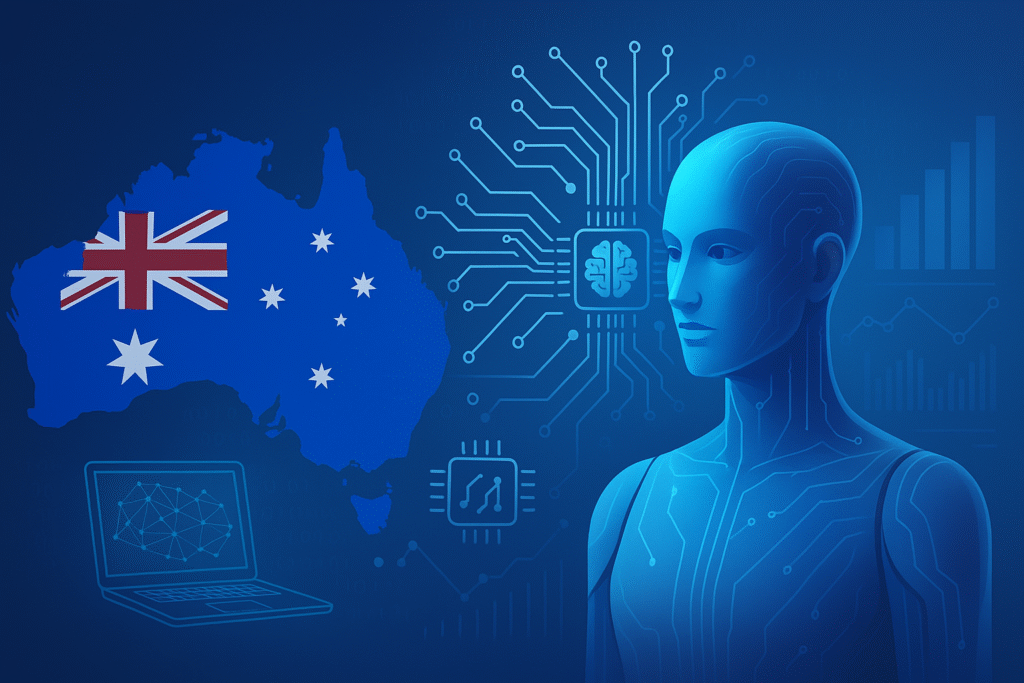In just a few short years, the AI revolution in Australia has transformed from cautious optimism to a full scale innovation movement. From education and healthcare to finance and creative industries, artificial intelligence is reshaping the economy. What began as speculative debates in 2017 has now matured into real, measurable impacts on businesses, workers, and government policy.
A Nation Awakens to the Potential of AI
Back in 2017, Changing Jobs: The Fair Go in the New Machine Age, co-authored by Mike Quigley and Andrew Charlton, painted a future where automation would disrupt traditional labour markets. Today, those predictions feel almost prophetic. Since then, companies like Canva, which was once valued at $1 billion, have surged to over $30 billion in worth.
And that’s just one example of how the AI revolution in Australia is generating massive economic opportunities. AI isn’t just a tech buzzword anymore; it’s an economic driver, says Dr. Kate Raynes Goldie, a digital strategist and researcher. Australia has quietly become a hotbed for AI powered startups and innovation hubs.
The Rise of Harrison.ai
One of the most compelling Australian success stories is Harrison.ai, a health tech company co-founded by brothers Aengus and Dimitry Tran. Their AI solutions are helping diagnose diseases like cancer with remarkable speed and accuracy.
Partnering with major hospitals and global pathology providers, Harrison.ai demonstrates how the AI revolution in Australia is not just about economic growth but also social good. AI in medicine is saving lives, Aengus says. It’s enhancing, not replacing, doctors.
Human Touch in the Age of Algorithms
Despite concerns about job displacement, there’s growing evidence that AI is augmenting rather than replacing human capabilities. Take Lawpath, a Sydney based legal-tech startup. By automating legal documents and advice, the company has made legal services affordable for thousands of small businesses while still employing dozens of lawyers and legal experts.
Anna Williams, a freelance graphic designer in Melbourne, used Lawpath’s services to start her own creative agency. AI saved me time and money, but I still rely on human advisors for big decisions. This fusion of AI efficiency and human judgment reflects a broader trend, Australians aren’t rejecting AI they’re embracing it.
Education and Workforce Transition
The real challenge lies not in the technology itself but in how society prepares for it. We’re not competing with AI we’re working with it, says Professor Toby Walsh, a leading AI researcher at UNSW. The Australian government has begun funding programs to help workers transition into AI driven fields.
Initiatives like AI4Jobs are training Australians in data science, machine learning, and digital ethics essential skills for thriving in the new economy. Universities have responded, too. The University of Melbourne, for example, now offers an AI specific MBA stream, blending business strategy with deep tech understanding.
Regional Inclusion and the Digital Divide
A key pillar of the AI revolution in Australia is ensuring inclusivity. While Sydney and Melbourne dominate the startup scene, regional areas are beginning to benefit. In places like Toowoomba and Ballarat, AI powered agritech startups are transforming how farmers manage crops, water usage, and yields.
Government backed incubators and internet infrastructure investment (via the NBN) are helping to bridge the digital divide. AgUnity, an Australian blockchain and AI company, works with farmers in Queensland to provide smart contracts and weather predictions, improving livelihoods through tech access.
Ethical and Policy Concerns
While optimism is high, experts caution against uncritical adoption. We need an Australian AI Code of Ethics that goes beyond big tech slogans, argues Lizzie O’Shea, lawyer and chair of Digital Rights Watch. Bias in AI systems, data privacy, and surveillance concerns are all real risks.
Balancing innovation with regulation will be essential to ensure the AI revolution in Australia remains beneficial and humane. The Australian Human Rights Commission has called for AI impact assessments and greater transparency in government algorithms particularly in areas like welfare, law enforcement, and immigration.
Algorithms as Allies
If one thing is clear, it’s that the AI revolution in Australia is no longer a distant concept it’s here, now, and accelerating. What separates Australia from many other nations is not just the tech talent, but its values, fairness, transparency, and inclusion.
We have a window to shape AI in our image, says Dr. Catriona Wallace, founder of the Responsible Metaverse Alliance. And that image must be ethical, human centered, and uniquely Australian.
Turning Possibilities into Prosperity
The AI era is not a threat to be feared but an opportunity to be grasped with both hands and open minds. Through thoughtful policy, inclusive innovation, and human centric design, Australia is not just surviving the digital disruption it’s leading it.
The AI revolution in Australia is more than lines of code it’s a new social contract between humans and machines. And if managed well, it could be the most transformative and inclusive revolution the country has ever seen.

